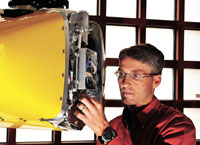Reykjavik to New START
As we approach the 25th anniversary of the Reykjavik Summit the National Academy of Sciences Committee on International Security and Arms Control (CISAC) and the USIP Center of Innovation: Science, Technology & Peacebuilding held a symposium on science and diplomacy in support of international security to examine the roles of transparency and confidence building in 21st Century nuclear security.
 The National Academy of Sciences Committee on International Security and Arms Control (CISAC) and the USIP Center of Innovation: Science, Technology & Peacebuilding held a symposium on science and diplomacy in support of international security. As we approach the 25th anniversary of the Reykjavik Summit, CISAC and USIP invited prominent scientists from Russia and the United States to examine the roles of transparency and confidence building in 21st Century nuclear security.
The National Academy of Sciences Committee on International Security and Arms Control (CISAC) and the USIP Center of Innovation: Science, Technology & Peacebuilding held a symposium on science and diplomacy in support of international security. As we approach the 25th anniversary of the Reykjavik Summit, CISAC and USIP invited prominent scientists from Russia and the United States to examine the roles of transparency and confidence building in 21st Century nuclear security.
The meeting addressed:
- Examples from past U.S.-Soviet/Russia interactions and how the lessons learned can be applied to current and future challenges.
- Monitoring and verification needs in the future.
- Scientists’ role in enhancing security communication and confidence between and among countries.
The Honorable William Perry, the Honorable Rose Gottemoeller, Academician Evgeny N. Avrorin, Dr. Richard Garwin, Colonel General Viktor Yesin (ret.), Professor Christopher Chyba, Thomas P. D’Agostino and several other distinguished speakers addressed these important topics.
Read an "On the Issues" Q+A with USIP expert Sheldon Himelfarb on science diplomacy.
8:00am - 8:30am | Registration
8:30am - 8:40am | Welcome
- Raymond Jeanloz, Introduction
UC Berkeley and Chair, NAS CISAC - E. William Colglazier
Executive Officer, NAS - Richard H. Solomon
President, U.S. Institute of Peace
8:45am - 9:30am | Reflections on Reykjavik and its Implications for the Future
Introduction of Speaker, Amb. Richard Solomon, U.S Institute of Peace
- Richard H. Solomon, Introduction
President, U.S. Institute of Peace - The Honorable William Perry
Michael and Barbara Berberian Professor Emeritus
The Hoover Institution and Stanford University
9:30am - 11:00am | Panel I: Technical Confidence Building to Support International Security: Lessons Learned From Confidence-Building and Arms Control Verification Experiments
- Christopher Chyba, Moderator
Professor of Astrophysical Sciences and International Affairs
Princeton University
The Black Sea Experiment
- Thomas Cochran
Senior Scientist, Nuclear Program
Natural Resources Defense Council - Viktor Firsov
All-Russian Research Institute of Automatics - Roald Sagdeev
Distinguished University Professor, Department of Physics
University of Maryland
Joint Verification Experiments (JVE) in 1988
- Paul Robinson
Director (ret.)
Sandia National Laboratory - Evgeny Avrorin
Scientific Director Emeritus of the Zababakhin Russian Federal Nuclear Center (ret.)
All-Russian Institute of Technical Physics
11:00am - 11:15am | Break
11:15am - 11:45am | The Role of Scientists in Building Confidence in Past, Current, and Future Arms Reductions Treaties
- Raymond Jeanloz, Introduction
Chair, NAS CISAC - The Honorable Rose Gottemoeller, Featured Speaker
Assistant Secretary, Bureau of Arms Control, Verification and Compliance
U.S. Department of State
12:00pm - 1:00pm | Lunchtime Speaker
- Thomas P. D’Agostino
Under Secretary for Nuclear Security & Administrator
National Nuclear Security Administration
1:00pm - 1:45pm | A Military Perspective on the Value of Science Diplomacy
- Raymond Jeanloz, Introduction
Chair, NAS CISAC - Col. Gen. Viktor Yesin (ret.), Featured Speaker
First Vice-President of Russian Federation Academy of Security, Defence, and Law Enforcement (ret.)
1:45pm - 3:00pm | Panel II: Scientists’ Role in Enhancing Communication and Confidence between and among Countries
- Cathleen Campbell, Moderator
President and Chief Executive Officer
Civilian Research and Defense Fund
The Role of U.S.-Soviet/Russian NGO Dialogues and Possible Directions for the Future
- Richard Garwin
IBM Fellow Emeritus
IBM Thomas J. Watson Research Center - Evgeniy Avrorin
All-Russian Institute of Technical Physics (ret.)
Disposition of Excess Weapons Fissile Material
- Nikolai N. Ponomarev-Stepnoi
Deputy Director Emeritus
Kurchatov Institute - John F. Ahearne
Director of the Ethics Program
Sigma Xi
3:00-3:15 Break
3:15-4:30 Panel III: Assessing Other Opportunities beyond the Bilateral U.S.-Russia Relationship
- Sheldon Himelfarb, Moderator
Associate Vice President, Center of Innovation for Science, Technology, and Peacebuilding
U.S. Institute of Peace
Use of Open-Source Imaging
- David Albright
President and Founder
Institute for Science and International Security
On Science Diplomacy and India
- Norman Neureiter
Director
AAAS Center for Science, Technology, and Security Policy
On Science Diplomacy for Security in South Asia
- Stephen Cohen
Senior Fellow, Foreign Policy, 21st Century Defense Initiative
The Brookings Institution
4:30pm - 4:45pm | Concluding Remarks
- Christopher Chyba
Professor of Astrophysical Sciences and International Affairs
Princeton University - Evgeniy Avrorin
Scientific Director Emeritus of the Zababakhin Russian Federal Nuclear Center (ret.)
All-Russian Institute of Technical Physics



